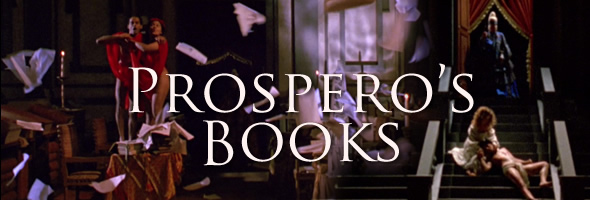
Color, 1991, 124m.
Directed by Peter Greenaway
Starring John Gielgud, Isabelle Pasco, Mark Rylance, Michael Clark, Michel Blanc, Erland Josephson, Tom Bell
King Records (Blu-ray & DVD) (Japan R0 HD/NTSC), Alliance (Finland, Sweden R2 PAL), Llamentol (Spain R2 PAL) / WS (1.78:1) (16:9)
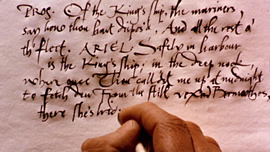 When The Cook, the Thief, His Wife and Her Lover hit American theaters in 1990, director Peter Greenaway scored a major breakout
When The Cook, the Thief, His Wife and Her Lover hit American theaters in 1990, director Peter Greenaway scored a major breakout 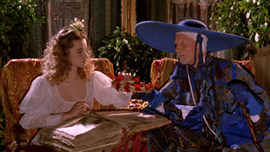 hit on the art house circuit thanks to much scandal over its MPAA-imposed X rating (which was refused by Miramax) and heaps of critical praise. Two of his earlier films were quickly rolled out as well, and anticipation ran high to see where he would go next. Thanks to the direct participation of Miramax and the most lavish European funding he ever received, the end product was Prospero's Books, an ambitious assault on the senses that found him experimenting on the big screen for the first time with Quantel Paintbox, a digital means of manipulated and overlaying filmed images in a painterly style he would go on to use in future films, and early high-definition television, in this case Hi-Vision in Japan. Amusingly, when the film was in post-production in Japan, tight security had to be kept due to the film's rampant nudity (the most ever in Greenaway's career), which went against the country's ban on pubic hair at the time in films and television. The film itself is a version of William Shakespeare's (most likely) final play, The Tempest, earlier filmed by Derek Jarman, with John Gielgud fulfilled a lifelong ambition by playing the title character, his favorite stage role.
hit on the art house circuit thanks to much scandal over its MPAA-imposed X rating (which was refused by Miramax) and heaps of critical praise. Two of his earlier films were quickly rolled out as well, and anticipation ran high to see where he would go next. Thanks to the direct participation of Miramax and the most lavish European funding he ever received, the end product was Prospero's Books, an ambitious assault on the senses that found him experimenting on the big screen for the first time with Quantel Paintbox, a digital means of manipulated and overlaying filmed images in a painterly style he would go on to use in future films, and early high-definition television, in this case Hi-Vision in Japan. Amusingly, when the film was in post-production in Japan, tight security had to be kept due to the film's rampant nudity (the most ever in Greenaway's career), which went against the country's ban on pubic hair at the time in films and television. The film itself is a version of William Shakespeare's (most likely) final play, The Tempest, earlier filmed by Derek Jarman, with John Gielgud fulfilled a lifelong ambition by playing the title character, his favorite stage role. 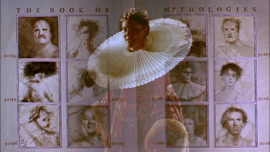 grown up on the island surrounded by spirits including Prospero's servant, Ariel (played by multiple actors of different ages), as well as the deformed Caliban (Clark), a slave of sorts to Prospero and son of the twisted witch Sycorax. When the traitors are shipwrecked on the island during a violent sea storm at the beginning of the film, Prospero must manipulate the many players to execute a plan whose true
grown up on the island surrounded by spirits including Prospero's servant, Ariel (played by multiple actors of different ages), as well as the deformed Caliban (Clark), a slave of sorts to Prospero and son of the twisted witch Sycorax. When the traitors are shipwrecked on the island during a violent sea storm at the beginning of the film, Prospero must manipulate the many players to execute a plan whose true 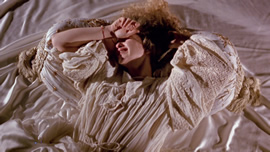 meaning only becomes apparent after Isabelle falls in love with another new visitor, Prince Ferdinand (Rylance).
meaning only becomes apparent after Isabelle falls in love with another new visitor, Prince Ferdinand (Rylance). 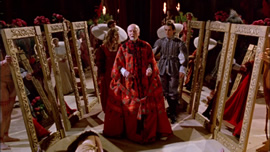
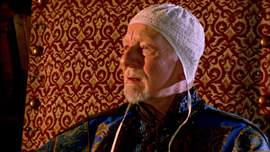 action at all. Incredibly, the film was somehow given an R rating in its complete form despite the nonstop parade of nudity; presumably its (mostly) non-sexual nature was the deciding factor. (On the other hand, the optically fogged Japanese laserdisc was a hilariously pointless experience.) At the time Miramax hadn't been acquired by Disney, so in typical fashion the home video rights bounced around a bit with a cropped laserdisc and VHS released by Fox. The fact that the film was completed in HD rather than on film meant that it was actually in an aspect ratio of 1.78:1 but projected in theaters at 1.85:1, but the cropping to 1.33:1 for home video proved ruinous as the vast majority of compositions were either compromised or wrecked entirely. Fortunately the thunderous Dolby Surround track remained intact, and it's still a brilliantly aggressive, manipulative mix guaranteed to keep your home theater active.
action at all. Incredibly, the film was somehow given an R rating in its complete form despite the nonstop parade of nudity; presumably its (mostly) non-sexual nature was the deciding factor. (On the other hand, the optically fogged Japanese laserdisc was a hilariously pointless experience.) At the time Miramax hadn't been acquired by Disney, so in typical fashion the home video rights bounced around a bit with a cropped laserdisc and VHS released by Fox. The fact that the film was completed in HD rather than on film meant that it was actually in an aspect ratio of 1.78:1 but projected in theaters at 1.85:1, but the cropping to 1.33:1 for home video proved ruinous as the vast majority of compositions were either compromised or wrecked entirely. Fortunately the thunderous Dolby Surround track remained intact, and it's still a brilliantly aggressive, manipulative mix guaranteed to keep your home theater active. 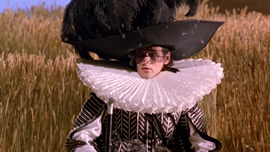 Cook could easily be worthy of the Criterion treatment. Hopes ran high in 2012 when the Scandinavian label announced both a Blu-ray and DVD at the same time as Greenaway's follow-up film, The Baby of Mâcon (which never received an American release in any form at all). Unfortunately the Blu-ray was canceled due to "element issues," and only a no-frills DVD ended up being released in a soft-looking but passable transfer from a 35mm print that was at least widescreen at last. For some reason
Cook could easily be worthy of the Criterion treatment. Hopes ran high in 2012 when the Scandinavian label announced both a Blu-ray and DVD at the same time as Greenaway's follow-up film, The Baby of Mâcon (which never received an American release in any form at all). Unfortunately the Blu-ray was canceled due to "element issues," and only a no-frills DVD ended up being released in a soft-looking but passable transfer from a 35mm print that was at least widescreen at last. For some reason 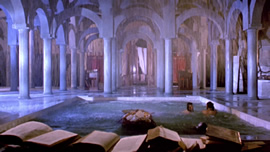 the supplemental short film Greenaway made at the same time, "A Walk through Prospero's Library," has yet to be included anywhere as a bonus feature, nor has a theatrical trailer ever turned up.
the supplemental short film Greenaway made at the same time, "A Walk through Prospero's Library," has yet to be included anywhere as a bonus feature, nor has a theatrical trailer ever turned up.